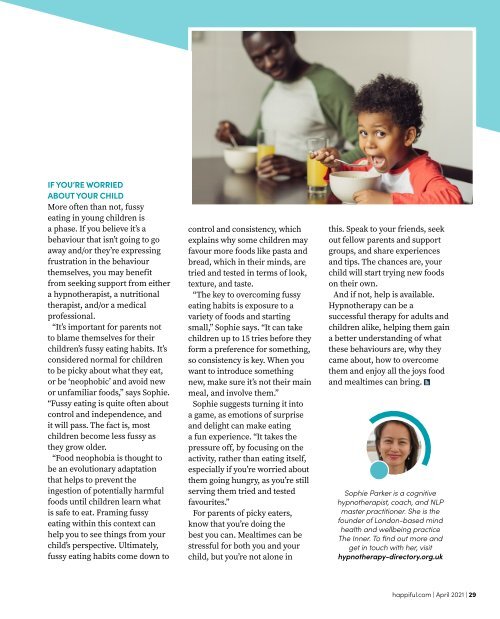You also want an ePaper? Increase the reach of your titles
YUMPU automatically turns print PDFs into web optimized ePapers that Google loves.
IF YOU’RE WORRIED<br />
ABOUT YOUR CHILD<br />
More often than not, fussy<br />
eating in young children is<br />
a phase. If you believe it’s a<br />
behaviour that isn’t going to go<br />
away and/or they’re expressing<br />
frustration in the behaviour<br />
themselves, you may benefit<br />
from seeking support from either<br />
a hypnotherapist, a nutritional<br />
therapist, and/or a medical<br />
professional.<br />
“It’s important for parents not<br />
to blame themselves for their<br />
children’s fussy eating habits. It’s<br />
considered normal for children<br />
to be picky about what they eat,<br />
or be ‘neophobic’ and avoid new<br />
or unfamiliar foods,” says Sophie.<br />
“Fussy eating is quite often about<br />
control and independence, and<br />
it will pass. The fact is, most<br />
children become less fussy as<br />
they grow older.<br />
“Food neophobia is thought to<br />
be an evolutionary adaptation<br />
that helps to prevent the<br />
ingestion of potentially harmful<br />
foods until children learn what<br />
is safe to eat. Framing fussy<br />
eating within this context can<br />
help you to see things from your<br />
child’s perspective. Ultimately,<br />
fussy eating habits come down to<br />
control and consistency, which<br />
explains why some children may<br />
favour more foods like pasta and<br />
bread, which in their minds, are<br />
tried and tested in terms of look,<br />
texture, and taste.<br />
“The key to overcoming fussy<br />
eating habits is exposure to a<br />
variety of foods and starting<br />
small,” Sophie says. “It can take<br />
children up to 15 tries before they<br />
form a preference for something,<br />
so consistency is key. When you<br />
want to introduce something<br />
new, make sure it’s not their main<br />
meal, and involve them.”<br />
Sophie suggests turning it into<br />
a game, as emotions of surprise<br />
and delight can make eating<br />
a fun experience. “It takes the<br />
pressure off, by focusing on the<br />
activity, rather than eating itself,<br />
especially if you’re worried about<br />
them going hungry, as you’re still<br />
serving them tried and tested<br />
favourites.”<br />
For parents of picky eaters,<br />
know that you’re doing the<br />
best you can. Mealtimes can be<br />
stressful for both you and your<br />
child, but you’re not alone in<br />
this. Speak to your friends, seek<br />
out fellow parents and support<br />
groups, and share experiences<br />
and tips. The chances are, your<br />
child will start trying new foods<br />
on their own.<br />
And if not, help is available.<br />
Hypnotherapy can be a<br />
successful therapy for adults and<br />
children alike, helping them gain<br />
a better understanding of what<br />
these behaviours are, why they<br />
came about, how to overcome<br />
them and enjoy all the joys food<br />
and mealtimes can bring.<br />
Sophie Parker is a cognitive<br />
hypnotherapist, coach, and NLP<br />
master practitioner. She is the<br />
founder of London-based mind<br />
health and wellbeing practice<br />
The Inner. To find out more and<br />
get in touch with her, visit<br />
hypnotherapy-directory.org.uk<br />
happiful.com | <strong>April</strong> <strong>2021</strong> | 29

















